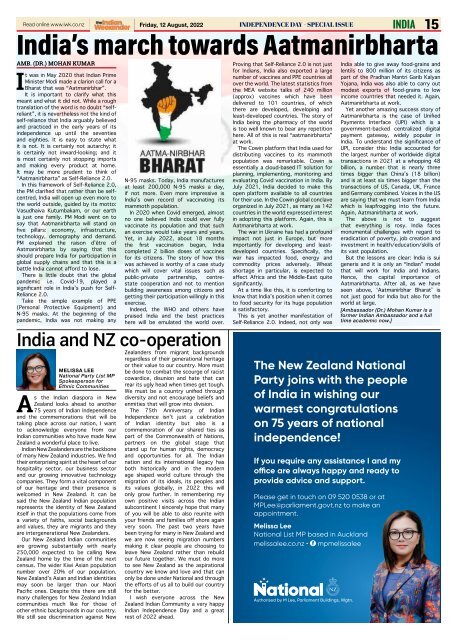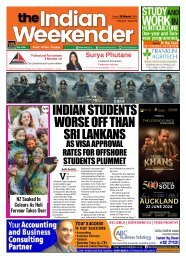The Indian Weekender
You also want an ePaper? Increase the reach of your titles
YUMPU automatically turns print PDFs into web optimized ePapers that Google loves.
Read online www.iwk.co.nz Friday, 12 August, 2022<br />
INDEPENDENCE DAY - SPECIAL ISSUE INDIA 15<br />
India’s march towards Aatmanirbharta<br />
AMB. (DR.) MOHAN KUMAR<br />
It was in May 2020 that <strong>Indian</strong> Prime<br />
Minister Modi made a clarion call for a<br />
Bharat that was “Aatmanirbhar”.<br />
It is important to clarify what this<br />
meant and what it did not. While a rough<br />
translation of the word is no doubt “selfreliant”,<br />
it is nevertheless not the kind of<br />
self-reliance that India arguably believed<br />
and practiced in the early years of its<br />
independence up until the seventies<br />
and eighties. It is easy to state what<br />
it is not. It is certainly not autarchy; it<br />
is certainly not inward-looking; and it<br />
is most certainly not stopping imports<br />
and making every product at home.<br />
It may be more prudent to think of<br />
“Aatmanirbharta” as Self-Reliance 2.0.<br />
In this framework of Self-Reliance 2.0,<br />
the PM clarified that rather than be selfcentred,<br />
India will open up even more to<br />
the world outside, guided by its motto:<br />
Vasudhaiva Kutumbakam, or our earth<br />
is just one family. PM Modi went on to<br />
say that Aatmanirbharta will stand on<br />
five pillars: economy, infrastructure,<br />
technology, demography and demand.<br />
PM explained the raison d’être of<br />
Aatmanirbharta by saying that this<br />
should prepare India for participation in<br />
global supply chains and that this is a<br />
battle India cannot afford to lose.<br />
<strong>The</strong>re is little doubt that the global<br />
pandemic i.e. Covid-19, played a<br />
significant role in India’s push for Self-<br />
Reliance 2.0.<br />
Take the simple example of PPE<br />
(Personal Protective Equipment) and<br />
N-95 masks. At the beginning of the<br />
pandemic, India was not making any<br />
India and NZ co-operation<br />
MELISSA LEE<br />
National Party List MP<br />
Spokesperson for<br />
Ethnic Communities<br />
As the <strong>Indian</strong> diaspora in New<br />
Zealand looks ahead to another<br />
75 years of <strong>Indian</strong> Independence<br />
and the commemorations that will be<br />
taking place across our nation, I want<br />
to acknowledge everyone from our<br />
<strong>Indian</strong> communities who have made New<br />
Zealand a wonderful place to live.<br />
<strong>Indian</strong> New Zealanders are the backbone<br />
of many New Zealand industries. We find<br />
their enterprising spirit at the heart of our<br />
hospitality sector, our business sector<br />
and our growing innovative technology<br />
companies. <strong>The</strong>y form a vital component<br />
of our heritage and their presence is<br />
welcomed in New Zealand. It can be<br />
said the New Zealand <strong>Indian</strong> population<br />
represents the identity of New Zealand<br />
itself in that the populations come from<br />
a variety of faiths, social backgrounds<br />
and values, they are migrants and they<br />
are intergenerational New Zealanders.<br />
Our New Zealand <strong>Indian</strong> communities<br />
are growing substantially with nearly<br />
250,000 expected to be calling New<br />
Zealand home by the time of the next<br />
census. <strong>The</strong> wider Kiwi Asian population<br />
number over 20% of our population.<br />
New Zealand’s Asian and <strong>Indian</strong> identities<br />
may soon be larger than our Maori<br />
Pacific ones. Despite this there are still<br />
many challenges for New Zealand <strong>Indian</strong><br />
communities much like for those of<br />
other ethnic backgrounds in our country.<br />
We still see discrimination against New<br />
N-95 masks. Today, India manufactures<br />
at least 200,000 N-95 masks a day,<br />
if not more. Even more impressive is<br />
India’s own record of vaccinating its<br />
mammoth population.<br />
In 2020 when Covid emerged, almost<br />
no one believed India could ever fully<br />
vaccinate its population and that such<br />
an exercise would take years and years.<br />
Yet, in July 2022, about 18 months<br />
the first vaccination began, India<br />
completed 2 billion doses of vaccines<br />
for its citizens. <strong>The</strong> story of how this<br />
was achieved is worthy of a case study<br />
which will cover vital issues such as<br />
public-private partnership, centrestate<br />
cooperation and not to mention<br />
building awareness among citizens and<br />
getting their participation willingly in this<br />
exercise.<br />
Indeed, the WHO and others have<br />
praised India and the best practices<br />
here will be emulated the world over.<br />
Zealanders from migrant backgrounds<br />
regardless of their generational heritage<br />
or their value to our country. More must<br />
be done to combat the scourge of racist<br />
cowardice, disunion and hate that can<br />
rear its ugly head when times get tough.<br />
We must be a country unified through<br />
diversity and not encourage beliefs and<br />
enmities that will grow into division.<br />
<strong>The</strong> 75th Anniversary of <strong>Indian</strong><br />
Independence isn’t just a celebration<br />
of <strong>Indian</strong> identity but also is a<br />
commemoration of our shared ties as<br />
part of the Commonwealth of Nations,<br />
partners on the global stage that<br />
stand up for human rights, democracy<br />
and opportunities for all. <strong>The</strong> <strong>Indian</strong><br />
nation and its international legacy has<br />
both historically and in the modern<br />
age shaped world culture through the<br />
migration of its ideals, its peoples and<br />
its values globally, in 2022 this will<br />
only grow further. In remembering my<br />
own positive visits across the <strong>Indian</strong><br />
subcontinent I sincerely hope that many<br />
of you will be able to also reunite with<br />
your friends and families off shore again<br />
very soon. <strong>The</strong> past two years have<br />
been trying for many in New Zealand and<br />
we are now seeing migration numbers<br />
making it clear people are choosing to<br />
leave New Zealand rather than rebuild<br />
our future together. We must do more<br />
to see New Zealand as the aspirational<br />
country we know and love and that can<br />
only be done under National and through<br />
the efforts of us all to build our country<br />
for the better.<br />
I wish everyone across the New<br />
Zealand <strong>Indian</strong> Community a very happy<br />
<strong>Indian</strong> Independence Day and a great<br />
rest of 2022 ahead.<br />
Proving that Self-Reliance 2.0 is not just<br />
for <strong>Indian</strong>s, India also exported a large<br />
number of vaccines and PPE countries all<br />
over the world. <strong>The</strong> latest statistics from<br />
the MEA website talks of 240 million<br />
(approx) vaccines which have been<br />
delivered to 101 countries, of which<br />
there are developed, developing and<br />
least-developed countries. <strong>The</strong> story of<br />
India being the pharmacy of the world<br />
is too well known to bear any repetition<br />
here. All of this is real “aatmanirbharta”<br />
at work.<br />
<strong>The</strong> Cowin platform that India used for<br />
distributing vaccines to its mammoth<br />
population was remarkable. Cowin is<br />
essentially a cloud-based IT solution for<br />
planning, implementing, monitoring and<br />
evaluating Covid vaccination in India. By<br />
July 2021, India decided to make this<br />
open platform available to all countries<br />
for their use. In the Cowin global conclave<br />
organized in July 2021, as many as 142<br />
countries in the world expressed interest<br />
in adopting this platform. Again, this is<br />
Aatmanirbharta at work.<br />
<strong>The</strong> war in Ukraine has had a profound<br />
impact not just in Europe, but more<br />
importantly for developing and leastdeveloped<br />
countries. Specifically, the<br />
war has impacted food, energy and<br />
commodity prices adversely. Wheat<br />
shortage in particular, is expected to<br />
affect Africa and the Middle-East quite<br />
significantly.<br />
At a time like this, it is comforting to<br />
know that India’s position when it comes<br />
to food security for its huge population<br />
is satisfactory.<br />
This is yet another manifestation of<br />
Self-Reliance 2.0. Indeed, not only was<br />
<strong>The</strong> New Zealand National<br />
Party joins with the people<br />
of India in wishing our<br />
warmest congratulations<br />
on 75 years of national<br />
independence!<br />
If you require any assistance I and my<br />
office are always happy and ready to<br />
provide advice and support.<br />
Please get in touch on 09 520 0538 or at<br />
MPLee@parliament.govt.nz to make an<br />
appointment.<br />
Melissa Lee<br />
National List MP based in Auckland<br />
melissalee.co.nz • mpmelissalee<br />
Authorised by M Lee, Parliament Buildings, Wgtn.<br />
India able to give away food-grains and<br />
lentils to 800 million of its citizens as<br />
part of the Pradhan Mantri Garib Kalyan<br />
Yojana, India was also able to carry out<br />
modest exports of food-grains to low<br />
income countries that needed it. Again,<br />
Aatmanirbharta at work.<br />
Yet another amazing success story of<br />
Aatmanirbharta is the case of Unified<br />
Payments Interface (UPI) which is a<br />
government-backed centralized digital<br />
payment gateway, widely popular in<br />
India. To understand the significance of<br />
UPI, consider this: India accounted for<br />
the largest number of worldwide digital<br />
transactions in 2021 at a whopping 48<br />
billion, a number that is nearly three<br />
times bigger than China’s (18 billion)<br />
and is at least six times bigger than the<br />
transactions of US, Canada, UK, France<br />
and Germany combined. Voices in the US<br />
are saying that we must learn from India<br />
which is leapfrogging into the future.<br />
Again, Aatmanirbharta at work.<br />
<strong>The</strong> above is not to suggest<br />
that everything is rosy. India faces<br />
monumental challenges with regard to<br />
eradication of poverty, job creation and<br />
investment in health/education/skills of<br />
its vast population.<br />
But the lessons are clear: India is sui<br />
generis and it is only an “<strong>Indian</strong>” model<br />
that will work for India and <strong>Indian</strong>s.<br />
Hence, the capital importance of<br />
Aatmanirbharta. After all, as we have<br />
seen above, ‘Aatmanirbhar Bharat’ is<br />
not just good for India but also for the<br />
world at large.<br />
[Ambassador (Dr.) Mohan Kumar is a<br />
former <strong>Indian</strong> Ambassador and a full<br />
time academic now.]


















